The Sligo Presbyterian Church Wednesday Morning Bible Study is continuing its study of the Old Testament by looking at how God led David from watching a flock to leading a nation. Below is an outline for the series.
- Session 1 - 1 Samuel 1:1–4:1
- Session 2 - 1 Samuel 4:2–7:17
- Session 3 - 1 Samuel 8:1–10:27
- Session 4 - 1 Samuel 11:1–12:25
- Session 5 - 1 Samuel 13:1–15:35
- Session 6 - 1 Samuel 16:1–17:58
- Session 7 - 1 Samuel 18:1–20:42
- Session 8 - 1 Samuel 21:1–23:29
- Session 9 - 1 Samuel 24:1–26:25
- Session 10 - 1 Samuel 27:1–29:11
- Session 11 - 1 Samuel 30:1–31:13
- Session 12 - 2 Samuel 1:1–3:21
- Session 13 - 2 Samuel 3:22–5:10
- Session 14 - 2 Samuel 5:11–8:18
- Session 15 - 2 Samuel 9:1–11:27
- Session 16 - 2 Samuel 12:1–14:33
- Session 17 - 2 Samuel 15:1–18:8
- Session 18 - 2 Samuel 18:9–20:26
- Session 19 - 2 Samuel 21:1–24:25
During our sixth session, we discussed the anointing of David, 1 Samuel 16:1–17:58. Below is a recording of our discussion and the text from 1 Samuel.
1 Samuel 16:1–17:58 [New Revised Standard Version]
The Lord said to Samuel, “How long will you grieve over Saul? I have rejected him from being king over Israel. Fill your horn with oil and set out; I will send you to Jesse the Bethlehemite, for I have provided for myself a king among his sons.” Samuel said, “How can I go? If Saul hears of it, he will kill me.” And the Lord said, “Take a heifer with you, and say, ‘I have come to sacrifice to the Lord.’ Invite Jesse to the sacrifice, and I will show you what you shall do; and you shall anoint for me the one whom I name to you.” Samuel did what the Lord commanded, and came to Bethlehem. The elders of the city came to meet him trembling, and said, “Do you come peaceably?” He said, “Peaceably; I have come to sacrifice to the Lord; sanctify yourselves and come with me to the sacrifice.” And he sanctified Jesse and his sons and invited them to the sacrifice.
When they came, he looked on Eliab and thought, “Surely the Lord’s anointed is now before the Lord.” But the Lord said to Samuel, “Do not look on his appearance or on the height of his stature, because I have rejected him; for the Lord does not see as mortals see; they look on the outward appearance, but the Lord looks on the heart.” Then Jesse called Abinadab, and made him pass before Samuel. He said, “Neither has the Lord chosen this one.” Then Jesse made Shammah pass by. And he said, “Neither has the Lord chosen this one.” Jesse made seven of his sons pass before Samuel, and Samuel said to Jesse, “The Lord has not chosen any of these.” Samuel said to Jesse, “Are all your sons here?” And he said, “There remains yet the youngest, but he is keeping the sheep.” And Samuel said to Jesse, “Send and bring him; for we will not sit down until he comes here.” He sent and brought him in. Now he was ruddy, and had beautiful eyes, and was handsome. The Lord said, “Rise and anoint him; for this is the one.” Then Samuel took the horn of oil, and anointed him in the presence of his brothers; and the spirit of the Lord came mightily upon David from that day forward. Samuel then set out and went to Ramah.
Now the spirit of the Lord departed from Saul, and an evil spirit from the Lord tormented him. And Saul’s servants said to him, “See now, an evil spirit from God is tormenting you. Let our lord now command the servants who attend you to look for someone who is skillful in playing the lyre; and when the evil spirit from God is upon you, he will play it, and you will feel better.” So Saul said to his servants, “Provide for me someone who can play well, and bring him to me.” One of the young men answered, “I have seen a son of Jesse the Bethlehemite who is skillful in playing, a man of valor, a warrior, prudent in speech, and a man of good presence; and the Lord is with him.” So Saul sent messengers to Jesse, and said, “Send me your son David who is with the sheep.” Jesse took a donkey loaded with bread, a skin of wine, and a kid, and sent them by his son David to Saul. And David came to Saul, and entered his service. Saul loved him greatly, and he became his armor-bearer. Saul sent to Jesse, saying, “Let David remain in my service, for he has found favor in my sight.” And whenever the evil spirit from God came upon Saul, David took the lyre and played it with his hand, and Saul would be relieved and feel better, and the evil spirit would depart from him.
Now the Philistines gathered their armies for battle; they were gathered at Socoh, which belongs to Judah, and encamped between Socoh and Azekah, in Ephes-dammim. Saul and the Israelites gathered and encamped in the valley of Elah, and formed ranks against the Philistines. The Philistines stood on the mountain on the one side, and Israel stood on the mountain on the other side, with a valley between them. And there came out from the camp of the Philistines a champion named Goliath, of Gath, whose height was six cubits and a span. He had a helmet of bronze on his head, and he was armed with a coat of mail; the weight of the coat was five thousand shekels of bronze. He had greaves of bronze on his legs and a javelin of bronze slung between his shoulders. The shaft of his spear was like a weaver’s beam, and his spear’s head weighed six hundred shekels of iron; and his shield-bearer went before him. He stood and shouted to the ranks of Israel, “Why have you come out to draw up for battle? Am I not a Philistine, and are you not servants of Saul? Choose a man for yourselves, and let him come down to me. If he is able to fight with me and kill me, then we will be your servants; but if I prevail against him and kill him, then you shall be our servants and serve us.” And the Philistine said, “Today I defy the ranks of Israel! Give me a man, that we may fight together.” When Saul and all Israel heard these words of the Philistine, they were dismayed and greatly afraid.
Now David was the son of an Ephrathite of Bethlehem in Judah, named Jesse, who had eight sons. In the days of Saul the man was already old and advanced in years. The three eldest sons of Jesse had followed Saul to the battle; the names of his three sons who went to the battle were Eliab the firstborn, and next to him Abinadab, and the third Shammah. David was the youngest; the three eldest followed Saul, but David went back and forth from Saul to feed his father’s sheep at Bethlehem. For forty days the Philistine came forward and took his stand, morning and evening. Jesse said to his son David, “Take for your brothers an ephah of this parched grain and these ten loaves, and carry them quickly to the camp to your brothers; also take these ten cheeses to the commander of their thousand. See how your brothers fare, and bring some token from them.” Now Saul, and they, and all the men of Israel, were in the valley of Elah, fighting with the Philistines. David rose early in the morning, left the sheep with a keeper, took the provisions, and went as Jesse had commanded him. He came to the encampment as the army was going forth to the battle line, shouting the war cry. Israel and the Philistines drew up for battle, army against army. David left the things in charge of the keeper of the baggage, ran to the ranks, and went and greeted his brothers. As he talked with them, the champion, the Philistine of Gath, Goliath by name, came up out of the ranks of the Philistines, and spoke the same words as before. And David heard him. All the Israelites, when they saw the man, fled from him and were very much afraid. The Israelites said, “Have you seen this man who has come up? Surely he has come up to defy Israel. The king will greatly enrich the man who kills him, and will give him his daughter and make his family free in Israel.” David said to the men who stood by him, “What shall be done for the man who kills this Philistine, and takes away the reproach from Israel? For who is this uncircumcised Philistine that he should defy the armies of the living God?” The people answered him in the same way, “So shall it be done for the man who kills him.” His eldest brother Eliab heard him talking to the men; and Eliab’s anger was kindled against David. He said, “Why have you come down? With whom have you left those few sheep in the wilderness? I know your presumption and the evil of your heart; for you have come down just to see the battle.” David said, “What have I done now? It was only a question.” He turned away from him toward another and spoke in the same way; and the people answered him again as before.
When the words that David spoke were heard, they repeated them before Saul; and he sent for him. David said to Saul, “Let no one’s heart fail because of him; your servant will go and fight with this Philistine.” Saul said to David, “You are not able to go against this Philistine to fight with him; for you are just a boy, and he has been a warrior from his youth.” But David said to Saul, “Your servant used to keep sheep for his father; and whenever a lion or a bear came, and took a lamb from the flock, I went after it and struck it down, rescuing the lamb from its mouth; and if it turned against me, I would catch it by the jaw, strike it down, and kill it. Your servant has killed both lions and bears; and this uncircumcised Philistine shall be like one of them, since he has defied the armies of the living God.” David said, “The Lord, who saved me from the paw of the lion and from the paw of the bear, will save me from the hand of this Philistine.” So Saul said to David, “Go, and may the Lord be with you!” Saul clothed David with his armor; he put a bronze helmet on his head and clothed him with a coat of mail. David strapped Saul’s sword over the armor, and he tried in vain to walk, for he was not used to them. Then David said to Saul, “I cannot walk with these; for I am not used to them.” So David removed them.
Then he took his staff in his hand, and chose five smooth stones from the wadi, and put them in his shepherd’s bag, in the pouch; his sling was in his hand, and he drew near to the Philistine. The Philistine came on and drew near to David, with his shield-bearer in front of him. When the Philistine looked and saw David, he disdained him, for he was only a youth, ruddy and handsome in appearance. The Philistine said to David, “Am I a dog, that you come to me with sticks?” And the Philistine cursed David by his gods. The Philistine said to David, “Come to me, and I will give your flesh to the birds of the air and to the wild animals of the field.” But David said to the Philistine, “You come to me with sword and spear and javelin; but I come to you in the name of the Lord of hosts, the God of the armies of Israel, whom you have defied. This very day the Lord will deliver you into my hand, and I will strike you down and cut off your head; and I will give the dead bodies of the Philistine army this very day to the birds of the air and to the wild animals of the earth, so that all the earth may know that there is a God in Israel, and that all this assembly may know that the Lord does not save by sword and spear; for the battle is the Lord’s and he will give you into our hand.”
When the Philistine drew nearer to meet David, David ran quickly toward the battle line to meet the Philistine. David put his hand in his bag, took out a stone, slung it, and struck the Philistine on his forehead; the stone sank into his forehead, and he fell face down on the ground. So David prevailed over the Philistine with a sling and a stone, striking down the Philistine and killing him; there was no sword in David’s hand. Then David ran and stood over the Philistine; he grasped his sword, drew it out of its sheath, and killed him; then he cut off his head with it. When the Philistines saw that their champion was dead, they fled. The troops of Israel and Judah rose up with a shout and pursued the Philistines as far as Gath and the gates of Ekron, so that the wounded Philistines fell on the way from Shaaraim as far as Gath and Ekron. The Israelites came back from chasing the Philistines, and they plundered their camp. David took the head of the Philistine and brought it to Jerusalem; but he put his armor in his tent. When Saul saw David go out against the Philistine, he said to Abner, the commander of the army, “Abner, whose son is this young man?” Abner said, “As your soul lives, O king, I do not know.” The king said, “Inquire whose son the stripling is.” On David’s return from killing the Philistine, Abner took him and brought him before Saul, with the head of the Philistine in his hand. Saul said to him, “Whose son are you, young man?” And David answered, “I am the son of your servant Jesse the Bethlehemite.”
.jpg)
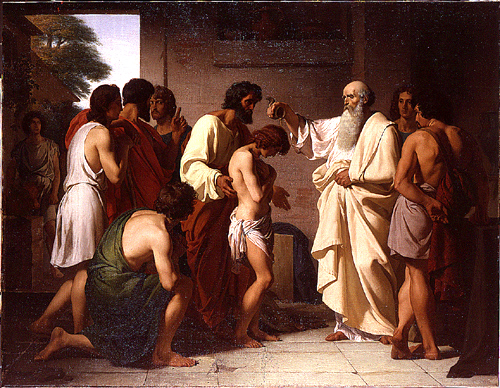
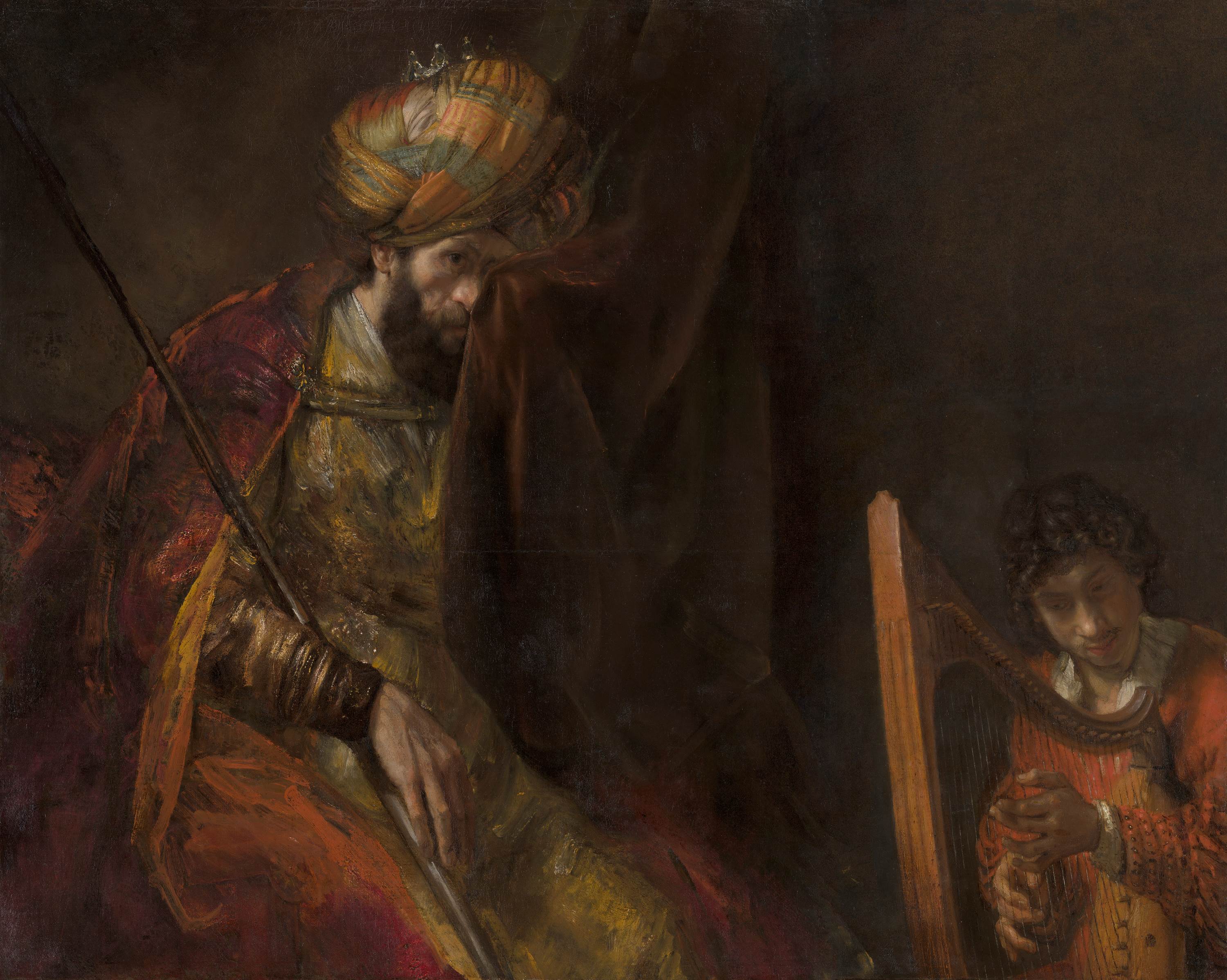
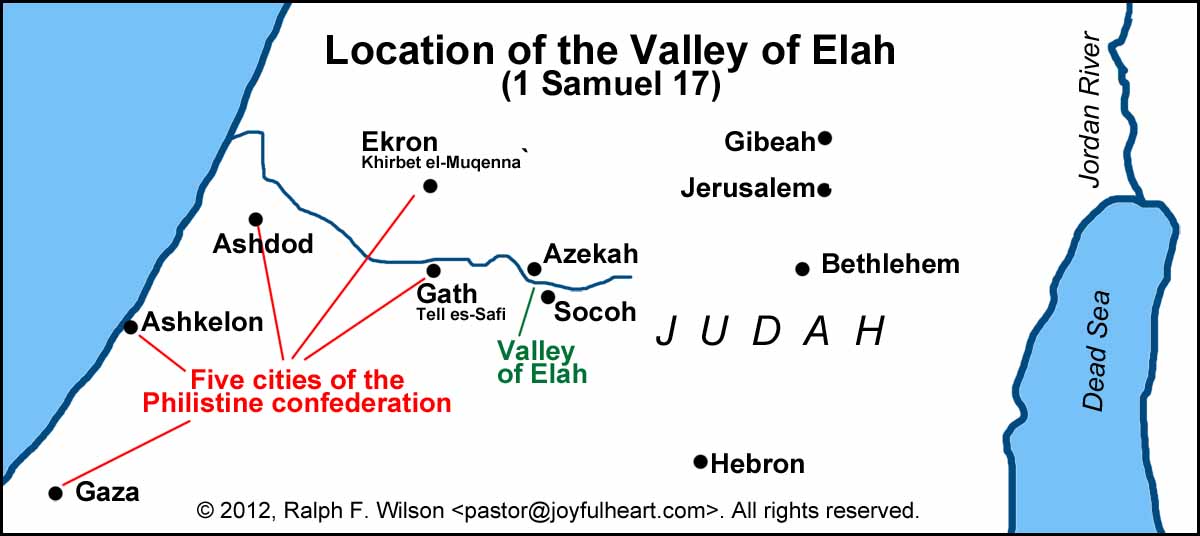
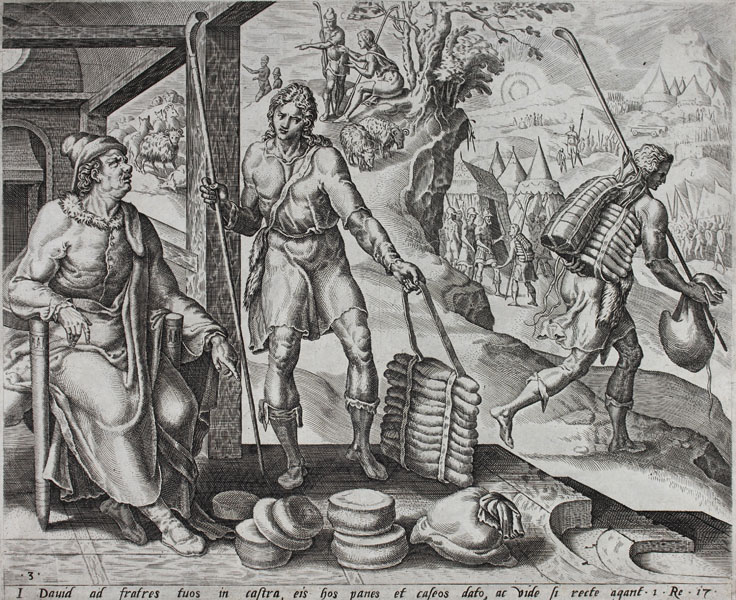
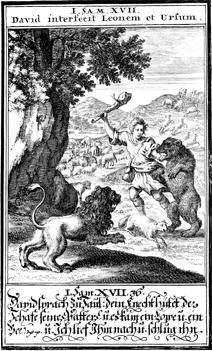


No comments:
Post a Comment